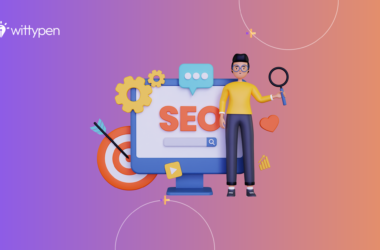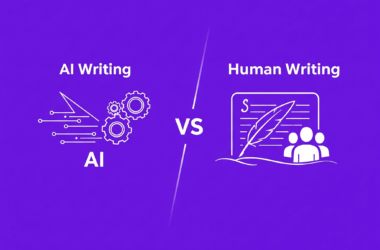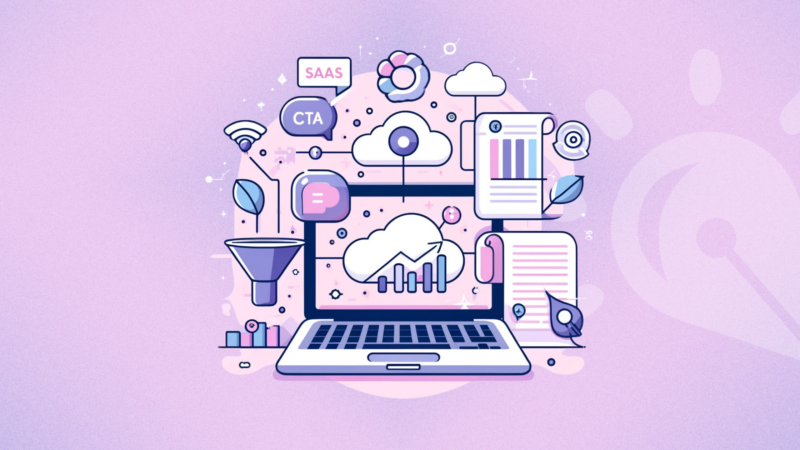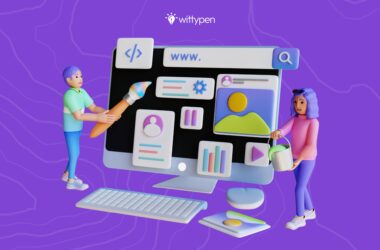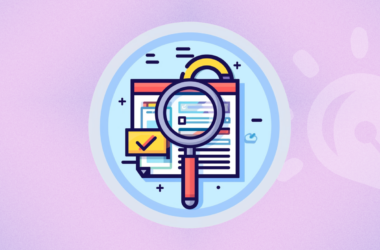Last updated on June 10th, 2024
Table of Contents
- Introduction to SaaS Marketing
- What is SaaS Marketing – Definition and Meaning?
- The Growth of SaaS Marketing and the Increasing Competition it Faces
- Benefits of SaaS Marketing in 2024
- Key Trends that Affect SaaS Marketing Strategies
- Challenges in SaaS Marketing
- Tips For Implementing Successful SaaS Marketing Strategies
- Conclusion – The Future of SaaS Marketing
Introduction to SaaS Marketing
What is SaaS Marketing – Definition and Meaning?
Definition of SaaS Marketing
SaaS marketing is a strategy that introduces and promotes products and services using ‘Software As A Service’. It is the best strategy to enhance consumer awareness about the business and its offerings.
Meaning of SaaS Marketing
SaaS marketing works on subscriptions, freemium services, premium models, and free trials. This strategy is designed to promote on-demand software applications to market business products and services.
Its data-oriented and customer-centric approach helps brands attract new customers, retain existing ones, and enhance customer relationships. This delivers continuous value to the customers.

How Does SaaS Marketing Differ From Traditional Marketing Strategies?
Traditional marketing strategies mainly work on selling licenses for software. Moreover, this approach is concretely sales-focused, with little attention to consumer experiences post-sales.
On the contrary, SaaS marketing strategies offer uninterrupted access to cloud-based software on paying a recurring fee. The most important feature is that it focuses on customer experiences post-sales, builds long-term customer retention, and continuously delivers value to them.
The revenue capacity in traditional marketing strategies is limited as it depends on new sales or upgrades. Nevertheless, revenue streams are predictable and recurring based on subscription models in the SaaS marketing approach.
The marketing techniques used in traditional approaches include obsolete techniques like cold calling and outbound calling, while SaaS marketing includes AI-based and content marketing formats.
Also, areas where traditional marketing lags, SaaS marketing is upfront in its approach. For example, it undergoes continuous development and encourages rigorous updates based on market trends and customer feedback. Moreover, it is highly adaptable and uses both online and offline means of advertising that helps organizations reach their ROI objective.
The Growth of SaaS Marketing and the Increasing Competition it Faces
Before we discuss the benefits and significance of SaaS marketing, let us understand some facts first:
- Software as a Service is expected to reach a $702.19 billion market by 2030.
- SaaS marketing enhances your branding and increases your ROI using strategies like content marketing, increased visibility, and customer retention. 74% of businesses have reported an increase in their generated leads due to content marketing strategies.
- SaaS applications form 70% of the total company software use. Microsoft leads as the largest SaaS provider by market capitalization in 2023 standing at $2.3 trillion.
- The CAGR of the global SaaS market is expected to grow at a rate of 18.7% from 2023-2030.
There are several benefits of employing SaaS marketing strategies and using its customer-focused approach. The growth of SaaS marketing is mainly due to its focus on:
- Data-driven approach
- Technologies used for SaaS Customer Acquisition to retain the existing ones and enhance customer satisfaction
- Creation of a loyal subscriber base
- Technological advancements and applications of AI-powered solutions
- Fast adaptation to changing market demands.
- Sound collaborations and international expansion
In this comprehensive guide, we will explore the advantages, challenges, and emerging trends in SaaS marketing.
Benefits of SaaS Marketing in 2024
SaaS marketing ensures you continuously engage with your customers even after they have purchased your product. It is a crucial strategy to build trust and loyalty.
SaaS marketing must include collecting customer feedback and working on it to modify their products according to consumer preferences and market demands. Cloud-based software should be effectively promoted to guarantee in this ever-growing customer SaaS customer acquisition arena.
Here are some key advantages of implementing effective SaaS Marketing Strategies in 2024:
1. Building Customer Experiences and Recurring Revenue
SaaS marketing augments customer experiences through customer service and engagement and ensures customer retention. Customer service is proactive and always available, ensuring customers receive the support they need when encountering problems with the software.
Customer retention further enables monetization capabilities and promises a continuous flow of revenue. A loyal subscriber base with recurring payments can lead to a constant and thriving revenue stream.
2. Scalability and Cost-Effectiveness of Marketing Efforts
SaaS marketing in 2024 is all about reaching a global audience using various techniques, like website upgradation, social media marketing, SEO-enriched strategies, and content marketing. It can help you reach a wide range of customers, use cost-effective methodologies, and generate more profit.
Consider how Grammarly, a grammar-checking tool, uses its social media campaigns and content marketing strategies to offer the best resources to content creators. SaaS marketing has propelled Grammarly into the global scene without the considerable cost of traditional advertising.
3. Reaching a Wider Global audience
The cloud-based nature of SaaS solutions makes them stand out among many marketing strategies available. This helps businesses reach a global audience.
One of the few examples is Hubspot. Consider how it uses its marketing automation platform to reach an international audience simply by converting its website content into multiple languages.
4. Measurable Results and Data-Driven Decision-Making
SaaS marketing is data-driven. This means you can regularly devise new techniques and refine the existing ones to attain a return on investment.
Using analytic tools like Google Analytics can help businesses attain information on customer demands, preferences, lead conversions, website traffic, and customer engagement.
Zoom, the video conferencing giant, developed a marketing strategy targeting remote workers during the pandemic by analyzing user data and trends. This strategy allows them to tap into growing markets and meet organizational objectives.

Key Trends that Affect SaaS Marketing Strategies
It is imperative to devise innovative strategies, considering the rapid evolution of the SaaS marketing arena. Let us look at some of the most significant trends in the SaaS marketing in 2024:
1. Personalization and Customer Experience
The days of sending our general marketing messages are long gone. Customers today prefer a customized and personalized experience that looks after their needs and preferences.
90% of leading brands claim that personalization highly impacts business profitability. 85% of organizations believe they offer personalized customer experiences, while 60% of customers agree to it.
This is where data-driven strategies help to gauge consumer behavioral insights and create customized experiences according to their evolving demands.
Actionable Suggestions:
- Use segmentation techniques to divide your audience based on user patterns, demographics, and behavioral patterns. This allows you to create personalized content.
- Use email marketing and CRM platform insights to customize your marketing strategies and recommend tailored content.
- Use A/B testing tools to customize your website’s landing page and other elements.
- Use interactive elements to create and foster authentic and long-term connections with customers.
- Use product recommendations and good-quality content to increase and retain engagement and drive conversions.
Real World Example:
Netflix is a leader in customization; it recommends content based on user preference and viewing history, ensuring every user gets a personalized experience. This increases user satisfaction and guarantees retention while increasing usage and subscription renewals.
2. Data-Driven Approach to Enhance Decision Making
In 2024, data analytics is a must; they provide a way to measure the success of SaaS marketing campaigns. Using data sets, SaaS branding can identify trends and behaviors and optimize their campaigns for maximum success.
Actionable Suggestions:
- Define your goals and set clear Key Performance Indicators (KPIs). Use trusted analytics tools to track KPIs like conversion rates and customer acquisition cost (CAC).
- Optimize your marketing strategies based on the data insights and strategize automation and customer experiences to maximize return on investment (ROI).
- Make use of predictive analytics to predict customer behavior and future market trends.
- Track user behavior and response to your website and marketing channels and identify improvement areas.
- Marketing teams should be well-equipped to understand complex datasets and use appropriate tools and resources like Google Analytics to enhance marketing campaign performance.
Real World Example:
Consider how Amazon uses consumer data, which is based on choices, shopping strategies, age, demographics, gender, and previous purchase history, to personalize marketing campaigns. This increases conversion rates and guarantees an effective marketing campaign.
3. AI and Automation
AI technology is quickly transforming SaaS marketing in 2024 by automating repetitive tasks, personalizing content creation and recommendation, and enhancing customer support experience. Since SaaS dominates the cloud computing market, global spending on public cloud services has been predicted to reach $679 billion in 2024. Chatbots and predictive analysis have changed how SaaS companies interact with customers and prospective customers.
- Chatbot interactions globally reached approximately 22 billion by 2023, growing from just 2.6 billion in 2019.
- 82% of businesses claim that AI will completely transform their businesses in the next 5 years.
Actionable Suggestions:
- Content is king, and you must create unique and engaging content that can help you communicate with your audience effectively and optimize SEO strategies.
- Consider automating significant and repetitive tasks using AI-powered tools.
- Use chatbots to offer effective and 24/7 customer support.
- Leverage predictive analysis to identify potential customers and carry out outreach efforts.
- Businesses can explore machine learning algorithms to optimize pricing strategies.
Real World Example:
Grammarly uses AI to correct grammar mistakes and make personalized writing suggestions for users. This AI-powered personalized approach enhances customer experience and ensures a high customer retention rate.
4. Voice Search Optimization
Voice technology has revolutionized the world of SaaS branding. Customers depend on voice assistants like Alexa, Siri, or Google Assistants to communicate on digital platforms.
97% of smartphone users use AI-powered voice assistants, while 40% use the voice-enabled search function at least once a day. There are more than 4 billion devices that are well-equipped with AI-powered voice assistants.
Businesses need to incorporate voice technology and integrate it critically into their marketing strategy.
Actionable Suggestions:
- Create voice-friendly content that will address common search queries, making it easier to appear in voice search results.
Include conversational keywords in your content that will aid voice search queries.
- Create FAQ pages that address common voice search inquiries.
Real World Example:
HubSpot content is optimized for voice search by creating conversational answers for common questions. This makes it easier for their content to appear in voice search results.
Challenges in SaaS Marketing
SaaS marketing in 2024 has immense potential; however, applying such strategies can also bring you some challenges. Let us look at some of the key issues that B2B SaaS marketers face and unveil relevant solutions:
1. To Stand Out in a Saturated Market
Did you know that the SaaS industry has grown 500% in only 7 years? From a mere $31.4 billion industry in 2015, it is expected to reach $344 billion by 2027.
80% of businesses are using one form of SaaS strategy, while 99% of companies are estimated to adopt at least one SaaS application by the end of 2024.
Considering these facts, differentiation is a key challenge in SaaS branding. It can be a challenge to stand out among competitors and showcase your business better than them.
What to Do:
- Invest in content marketing and use resources like SEO optimization, influencer marketing, and social media marketing strategies.
- Utilize social proof and strengthen your existing partnerships
- Implement personalized marketing strategies and use data-driven strategies to enhance user experience
- Develop a strong product USP and focus on niche markets.
2. Earning Leads and Converting them into Consumers
The target audience market is huge and complex. It could be daunting for businesses to identify leads, prompt and encourage them, and finally convert them into consumers. The SaaS industry is quite competitive, and businesses must leap to offer attractive solutions that can help them attract and keep customers.
What to Do:
- Deliver exceptional customer service and highlight customer experiences and testimonials.
- Offer personalized customer experiences and refine your existing marketing approach.
- Optimize your website, create informative content for consumers, and connect with them on various platforms.
- Strive to build online communities and offer free trials and demos.
3. Adapting to the Changing Industry Trends and Customer Demands
A successful B2B SaaS marketing strategy that worked tremendously well previously could abruptly fail today. The reasons are evolving consumer preferences and transformations in the industry trends. Technology is advancing and the markets change every day. Businesses could face this challenge, and many succumb to the pressure of keeping up with the pace.
What to Do:
- Drive innovations and experiment with various strategies.
- Adopt advancing technologies like voice search features, automation, and generative AI.
- Rely on stakeholder insights and customer feedback to understand the demands of the changing markets and consumer needs.
- Conduct thorough market research, attend webinars and events related to industry conferences and publications, and build strategic relationships within the network.
- Adopt agile practices, implement stringent security measures, and focus on compliance and sustainability.
4. Guaranteeing Profitability and Return on Investment
Justifying the value and ROI of SaaS marketing efforts can be challenging. This holds when considering the competitive bidding environments or intricate sales cycles. However, the right tools and strategies can help demonstrate the advantages of marketing investments.
What to Do:
- Set clear marketing goals and use analytics tools to track the performance of your strategies and measure ROI accurately.
- Promote AI and machine strategies to improve personalized marketing.
- Communicate transparently with customers regarding the benefits your business can offer
- Regularly update your security protocols.

Tips For Implementing Successful SaaS Marketing Strategies
The B2B SaaS Marketing strategy requires a customer-focused approach and data-driven insights to deliver excellent results. Businesses must keep up with emerging trends and automate AI processes to enhance the results of the SaaS branding campaign.
Here are some tips that can help you create a winning B2B SaaS marketing strategy:
1. Creating an Effective Content Marketing Strategy
Use effective content marketing in B2B SaaS marketing by following these best practices:
- Identify product information and core topics that will help your customers decide why they should invest in them and what value they can bring.
- Use effective tools to identify trending topics and use relevant keywords, TOCs, and appropriate meta information to make it SEO-optimized.
- Plan and schedule your content using a content calendar.
- Use a variety of content formats to cater to your buyer’s preferences.
2. Utilizing Free Trials and Demos Effectively
Demos and free trials are an effective SaaS marketing strategy because of the following reasons:
- Help your audience experience your SaaS product.
- Make the login and registration process user-friendly and easy to access.
- Establish a simple onboarding process.
- Offer personalized support and informative and educational content on your SaaS solution.
- Gather user feedback throughout their free trial
- Identify areas where you need to improve.
- Use tools to track user engagement that will encourage conversion.
3. Creating a Strong Online Community
A strong online community can increase brand awareness. Follow these tips for the best results:
- Select a platform for your online community and encourage participation by engaging with your target audience.
- Pose questions, conduct virtual events, and share valuable content.
- Leverage community management tools and measure user engagement metrics.
- Recognize active users by offering rewards.
4. Using social media marketing
Social media helps in B2B SaaS lead generation. Here are some best practices that can help you leverage social media platforms:
- Identify relevant platforms and share valuable content that can help you build credibility and attract customers.
- Make the most of social media advertising.
- Engage with your audience in real-time.
- Monitor conversations, ask for consumer feedback, and post testimonials and customer experiences on your official social media networks.

Conclusion – The Future of SaaS Marketing
SaaS marketing strategies help you stand out in a crowded marketplace. Though it is one of the most productive marketing strategies, it comes with its share of challenges and advantages. We have covered the benefits and challenges, along with solutions and best SaaS marketing practices.
By adopting technologically advanced solutions, AI-powered tools, personalization, and data-driven decision-making, a business can attract new customers. Incorporate the benefits of SaaS marketing and retain existing customers, convert leads to consumers, and ensure that your products and services remain relevant.
Key Takeaways on Emerging Trends and Technologies
The SaaS industry is fueled by innovation, cutting-edge technologies, and evolution. Here are some emerging trends and new technologies that will reshape SaaS marketing in 2024:
- Macro and micro-influencers with specializations in specific niches play a critical role in the future of SaaS branding strategies.
- Businesses must optimize their websites and content strategies using voice search, considering how rapidly voice chart optimization is developing. This will enhance user discovery and increase engagement.
- Account-based Marketing should be adopted to empower targeted campaigns that are focused on specific accounts.
- Implement Augmented Reality and Virtual Reality technology for immersive customer interactions and interaction-free trials and demos.
- Introduce Predictive analytics, which can support your sales and marketing teams in prioritizing high-quality leads, ultimately leading to an increase in the number of conversions.
- Hybrid cloud solutions allow businesses to use public and private cloud resources which simplify the data localization.
- Subscription management tools in the SaaS industry help businesses monitor subscription metrics, automated pricing, and other processes.
- SaaS companies are leveraging Artificial Intelligence and Machine Learning to personalize customer experience and enhance engagements.
- SaaS applications are also using blockchain technology to enhance their data security and protect the processing of transactions.
- SaaS businesses focus on ongoing customer support and user onboarding to ensure growing customer satisfaction.
Today, it has become paramount to implement a sound B2B SaaS marketing strategy that will create and nurture long-term customer relationships. Incorporating the marketing practices recommended above, you can ultimately create quality leads and increase conversions.
If you are ready to take the next step, explore Wittypen’s services and elevate your SaaS marketing to the next level. Make the most of our expert and personalized consultations, where we pay heed to your preferences and expectations and integrate them into a competitive SaaS marketing strategy. Connect with us and discover how you can elevate your SaaS business.



